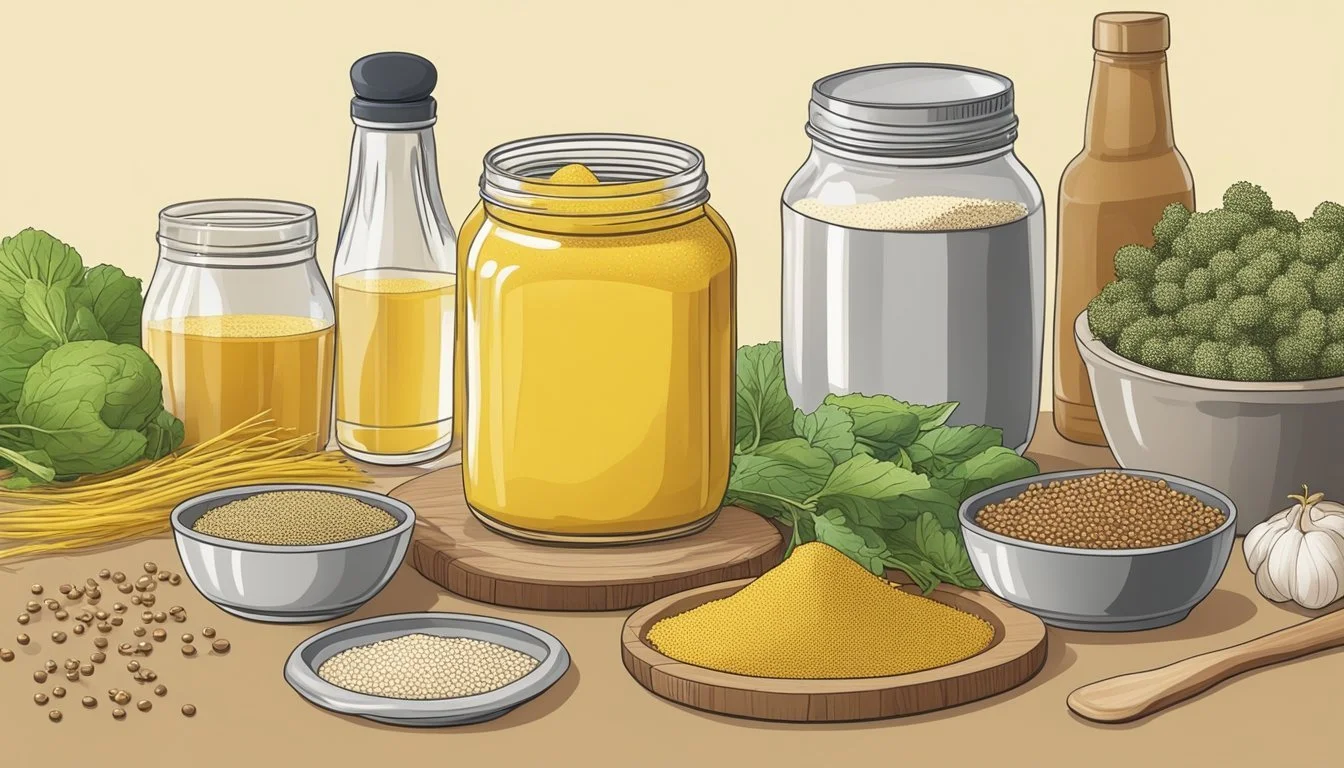Beer Mustard Substitutes
Top Alternatives for Your Recipes
Beer mustard, a condiment that marries the tangy complexity of mustard with the robust flavors of beer, is a favorite among gourmet food lovers and home cooks alike. It's appreciated for its unique taste, which can enhance everything from sausages to sandwiches. However, when beer mustard isn't available, knowing suitable substitutes can save a meal, allowing chefs to maintain the intended flavor profile in their dishes.
Substitutions for beer mustard depend on the recipe's requirements. If the dish calls for the mild yet rich flavor that beer mustard typically provides, one might consider using Dijon mustard mixed with a small amount of beer to imitate the original taste. For those who prefer a non-alcoholic option, combining a standard yellow mustard with a touch of apple cider vinegar may offer a similar sharpness and depth.
Home chefs shouldn't hesitate to experiment with different blends such as honey mustard for sweetness or horseradish for heat, adjusting proportions to reach the desired flavor. By understanding the taste dynamics of beer mustard, alternatives can be crafted from common pantry items, ensuring culinary creations remain delicious, even when the original ingredient is out of reach.
Understanding Beer Mustard
Beer mustard is a distinctive condiment combining the tangy, spicy flavors of traditional mustard with the depth of flavor provided by beer. It stands out in its taste profile and usage from other types of mustard.
Characteristics of Beer Mustard
Beer mustard incorporates mustard seeds, vinegar, and various spices, blended with beer, which not only enhances its flavor but also contributes to a creamier texture when compared to regular mustard. Its unique characteristics are:
Flavor: A robust, tangy taste with an overarching spicy note, accented by the type of beer used.
Texture: Generally smoother and thicker, due to the infusion of beer.
Color: It varies from bright yellow to deeper amber, depending on the mustard seeds and beer variety.
Common Uses For Beer Mustard
Beer mustard is versatile in use, making it a popular choice in various culinary applications:
As a condiment: Often served with meats, sausages, and pretzels.
In dressings: Used to add a tangy twist to vinaigrettes and salads.
Marinades: It provides depth to marinades for meats due to its complex flavor profile.
By understanding these aspects of beer mustard, one can better grasp its role in cooking and how it might be substituted if necessary.
Primary Beer Mustard Substitutes
When looking for substitutes for beer mustard in recipes, one must consider the balance of tanginess, sweetness, and spice that beer mustard typically offers. The following alternatives provide similar flavor profiles that can complement the dishes as effectively as beer mustard.
Dijon Mustard
Dijon mustard is a suitable substitute for beer mustard due to its tangy and slightly spicy flavor. It comes from the Dijon region of France and offers a smoother consistency than whole grain versions. For every tablespoon of beer mustard, a cook may use an equivalent amount of Dijon mustard to achieve a similar taste profile in their recipe.
Whole Grain Mustard
Whole grain mustard is another alternative with a texture that closely mimics beer mustard. It's made with partially crushed mustard seeds, providing a robust flavor with a subtle tanginess and heat. One can use whole grain mustard in a one-to-one ratio when replacing beer mustard, especially in recipes where the seeds' texture is desired.
Honey Mustard
For recipes that benefit from added sweetness, honey mustard is an excellent choice. It combines the mild flavor of yellow mustard with honey, resulting in a balanced sweetness that can replace beer mustard where a milder taste is acceptable. Adjust the sweetness level by starting with less honey mustard and adding it incrementally.
Yellow Mustard
The universally recognized yellow mustard, known for its vibrant color and mild flavor, can be used as a beer mustard substitute. Containing vinegar and spices, it delivers a milder version of the sharpness one would expect from beer mustard. Inclusion of yellow mustard should be in a measure-for-measure swap but adjusted according to the desired piquancy.
Horseradish Sauce
Horseradish sauce introduces a bold, piquant kick, which can stand in for the more complex layers of flavor in beer mustard. Often mixed with vinegar and cream, horseradish sauce should be used sparingly; a small amount can go a long way to replicate beer mustard's heat. It's an excellent alternative for those preferring a spicier impact in their dish.
Homemade Mustard Alternatives
When creating mustard alternatives at home, individuals can replicate the tangy, spicy, and complex flavors of beer mustard using readily available ingredients. The following methods provide distinct options ranging from traditional approaches to inventive flavor matches.
DIY Mustard With Vinegar
One can create a basic mustard substitute by combining dry mustard powder with a choice of vinegar, which acts as both a preservative and flavor enhancer. A recipe may include:
1 tablespoon dry mustard
3 tablespoons vinegar (white wine or apple cider vinegar recommended)
1 teaspoon water (adjust for desired consistency)
1/4 teaspoon salt
This mixture can be adjusted according to personal taste preferences for tanginess and kick.
Mustard Seed Blends
Using mustard seeds is an approach for those desiring a more authentic mustard texture. A simple blend could be:
1/4 cup ground mustard seed
1/4 cup white wine or water (for a milder flavor)
Salt to taste
Optional: A pinch of turmeric for color
It is advised to let the blend sit for a while, allowing the flavors to fully develop.
Non-Traditional Mustard Flavors
For adventurous home cooks looking to mimic the richness of beer mustard without traditional mustard, one could opt for homemade dijon mustard substitutes such as:
Horseradish or wasabi, used sparingly for heat
Mayonnaise with added spices for a creamy base
These alternatives can be fine-tuned to create a condiment that complements the dish's existing flavors while providing a mustard-like influence.
Commercial Alternatives To Beer Mustard
When seeking a substitute for beer mustard, one may consider commercial alternatives that cater to similar flavor profiles or desired textures. These alternatives range from spicy options that mimic the heat of beer mustard to creamy condiments that provide a similar consistency.
Wasabi and Other Spicy Options
Wasabi, a pungent condiment related to horseradish, offers a sharp heat that can stand in for beer mustard in recipes where a spicy kick is essential. In moderation, wasabi or prepared horseradish sauce can replace beer mustard, especially in dishes such as sushi or roast beef where its intense flavor can be appreciated.
Mustard Powder: For a dry alternative, mustard powder mixed with a small amount of water can create a paste with a sharp taste and heat comparable to beer mustard.
Hot English Mustard: Another potent substitute, Hot English mustard provides a deep heat that complements meats and cheeses.
Creamy Alternatives Like Mayonnaise
Mayonnaise, while lacking the tang and heat of beer mustard, is a creamy alternative that can be used as a base to create a similar texture. For a closer flavor match:
Combine mayonnaise with a small amount of mustard powder or brown mustard seeds ground into a paste.
The addition of spices common in beer mustard, like garlic or herbs, to the mayonnaise can enhance its flavor profile.
Specialty Condiments
Specialty condiments provide variety and depth of flavor while preserving the unique characteristics of beer mustard. Options include:
Dijon Mustard Substitute: A similar complex flavor, Dijon is a finely ground mustard that offers a smooth consistency and a sharp taste.
English Mustard: Providing a strong, clean mustard flavor, English mustard can be used in a one-to-one substitution for beer mustard to maintain the zesty and tangy notes in recipes.
Mustard Substitutes for Dietary Restrictions
When selecting mustard substitutes for individuals with dietary restrictions, it's important to ensure adherence to gluten-free and vegan standards. Here are options that cater to these specific needs without compromising flavor.
Gluten-Free Options
For those avoiding gluten, gluten-free mustard substitutes must eliminate ingredients like malt vinegar which is commonly found in certain mustards. The following are safe and flavorful alternatives:
Mustard powder: Pure mustard powder is inherently gluten-free and can be mixed with a gluten-free liquid to generate a mustard-like paste.
Plain yogurt: A gluten-free option that can mimic the creaminess and tang of beer mustard. One can add a pinch of mustard powder to enhance the flavor.
When using these substitutes in recipes, individuals should measure equivalently to the beer mustard they are replacing.
Vegan Mustard Substitutes
Vegan diets require mustard alternatives free from animal-derived components, such as honey or eggs, which some mustards may contain. Observe these vegan-friendly substitutes:
Lecithin powder: Derived from sunflower, lecithin powder can emulsify and thicken sauces, much like mustard, without using egg yolk powder.
Egg yolk powder: This is an animal product and isn't suitable for a vegan diet; vegans should avoid this substitute entirely.
For vegans looking for a direct replacement, reviewing product labels to confirm the absence of animal products is essential. Gluten-free and vegan labels on packaging can serve as a quick reference guide.
Pairing Substitutes With Dishes
When looking for beer mustard substitutes for various dishes, it's essential to consider the role of beer mustard's unique taste and how it melds with other ingredients. The following subsections detail appropriate substitutes that complement the nature and essence of dressings, marinades, glazes, and dips.
Salads and Dressings
For salads that traditionally partner with a beer mustard vinaigrette, a combination of whipped butter, mustard seeds, or powder can emulate the creamy tanginess. Enhance this base with white wine vinegar and seasoning to mirror the complex flavor profile that beer mustard provides.
Vinaigrettes: Replace beer mustard with a dijon mustard and white wine mixture to retain a sharp depth and to enhance the salad flavors.
Marinades and Rubs
Marinades and rubs benefit from ingredients that tenderize and impart deep flavors into meats or vegetables. A robust horseradish sauce substitute offers a piquant edge, especially for beef, complementing it without overwhelming the dish's intrinsic flavors.
Marinades: Use dijon mustard as a base; it provides the necessary acidity to tenderize, while its zest enriches the marinating mixture.
Glazes and Dips
Glazes and dips require a balance of flavor and texture. Here, the role of beer mustard is often to add a subtle hint of spice and complexity. Instead, one can use wasabi in small amounts to provide a similar kick, ensuring the spread retains its intended character.
Glazes: For a sweet and savory glaze, integrate dijon mustard with ingredients like honey or brown sugar to simulate beer mustard's distinctive taste in a more controlled and consistent manner.
Enhancing Flavors With Substitutes
When seeking alternatives to beer mustard, one should consider how substitutes can maintain or enhance the unique blend of acidity, sweetness, and pungent flavors beer mustard offers, along with its distinctive spice profile.
Acidity and Sweetness
For dishes where the sharp tang of beer mustard is essential but a touch of sweetness is desired, honey mustard is an effective substitute. With a mix of honey and mustard sauce, it retains the mustard notes while adding a smooth sweetness. To replicate the acidity typically provided by beer mustard, one might opt for apple cider vinegar. It delivers a similar acidic punch with a hint of fruitiness.
Substitution Ratios:
Honey Mustard: Use a 1:1 ratio when substituting for beer mustard.
Apple Cider Vinegar: Start with a small amount and adjust to taste.
Mild and Pungent Alternatives
For those requiring a less intense but still pungent flavor, mayonnaise can serve as a base for creating a less spicy version of mustard. The mildness of mayo combined with a small amount of ground mustard seed or prepared mustard creates a milder, creamier alternative without the characteristic bite of beer mustard.
Recommended Combination:
Mix mayonnaise with a small amount of prepared mustard or ground mustard seed.
Creating Depth With Spices
Spices are invaluable when one aims to mimic the complex flavor profile of beer mustard. By using a blend of spices such as turmeric, garlic powder, and paprika, cooks can achieve depth in their dishes. These spices provide earthy undertones and a touch of warmth that can resemble the flavors found in beer mustard. Salt and sodium levels should be adjusted to avoid overpowering the dish.
Spices To Consider:
Turmeric
Garlic Powder
Paprika
Note: Start with small quantities and increase as needed for flavor match.
Crafting the Perfect Substitute
When creating a beer mustard substitute, the focus must be on matching the original's complex flavor profile and consistency. Attention to detail is crucial in selecting the right ingredients to achieve a balance of taste and texture.
Balancing Taste and Texture
To effectively mimic the tang and depth of beer mustard, one must find ingredients that offer a similar piquancy and body. White vinegar provides the necessary acidity, while its neutral flavor allows for the addition of other spices. For a substitute that resembles the smooth, creamy consistency of mustard, egg yolks can be employed to emulsify the mixture, ensuring that the texture remains consistent throughout.
Texture: Aim for a balance between smoothness and viscosity, considering the mustard's application.
Acidity: White vinegar is the starting point for achieving the characteristic tang of beer mustard.
Experimenting With Ingredient Ratios
Specificity in the proportion of ingredients is crucial in recreating the complex flavor of beer mustard. Begin with a base ratio and adjust as needed:
Ingredient Starting Ratio White vinegar 1 part Water 1 part Mustard seeds 1 part Other spices to taste
Taste and adjust the concoction incrementally, ensuring not to overwhelm the senses with overpowering flavors.
Making Your Own Mustard
Home-made mustard provides a foundation for customization that is unparalleled. Starting with whole mustard seeds, one can control the grind to achieve the desired texture. Simmer these in a mixture of water and white vinegar to begin the creation process. Once cooled, they can be blended into a smooth or coarsely ground paste, depending on preference.
Ingredients: A simple mixture of white vinegar, water, and mustard seeds can be the base.
Creaminess: Egg yolks may be added to enrich the mustard and provide a creamy texture.
By methodically blending these components, one can craft a beer mustard substitute that does not compromise on flavor or texture, tailored to compliment a variety of dishes.
Final Thoughts and Tips
When searching for a beer mustard substitute, it’s crucial to consider flavor compatibility and expected shelf life to maintain the integrity of one's dishes.
Selecting the Right Substitute
When choosing an alternative to beer mustard, one should select a substitute that closely matches the original's robust and spicy profile. Various types of mustard can offer a similar flavor experience.
Spicy Brown Mustard: This is a strong alternative with a deep flavor, suitable for recipes where the boldness of beer mustard is desired.
Dijon Mustard: With a complex flavor and less acidity, Dijon is a sophisticated option.
Yellow Mustard: For a milder taste and less heat, one might opt for this common type.
Whole Grain Mustard: This adds texture as well as a piquant taste to dishes.
It's important to taste and adjust the seasonings in your dish if using a substitute to ensure the correct balance of flavors.
Storage and Shelf Life
Mustards, whether beer mustard or its alternatives, generally possess a long shelf life due to their acidic content, which acts as a preservative.
Storage guidelines typically include:
Keep mustard in a cool, dark place before opening.
Refrigerate after opening to best preserve flavor.
Ensure the lid is tightly sealed after each use.
For optimal freshness, most mustard types can be stored in the fridge for up to one year. Always check the consistency, smell, and taste for signs of spoilage before use. If mustard develops an off smell, taste, or appearance, it should be discarded.









